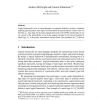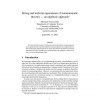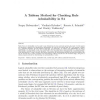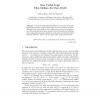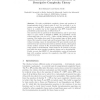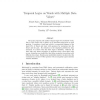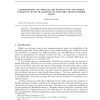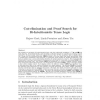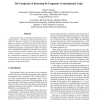119
Voted
ENTCS
2008
15 years 2 months ago
2008
Logical frameworks serve as meta-languages to represent deductive systems, sometimes requiring special purpose meta logics to reason about the representations. In this work, we de...
126
Voted
AMAI
2006
Springer
15 years 2 months ago
2006
Springer
We show that the concepts of strong and uniform equivalence of logic programs eneralized to an abstract algebraic setting of operators on complete lattices. Our results imply char...
115
Voted
ENTCS
2010
15 years 2 months ago
2010
Rules that are admissible can be used in any derivations in any axiomatic system of a logic. In this paper we introduce a method for checking the admissibility of rules in the mod...
88
Voted
CORR
2008
Springer
15 years 2 months ago
2008
Springer
Existential fixed point logic (EFPL) is a natural fit for some applications, and the purpose of this talk is to attract attention to EFPL. The logic is also interesting in its own ...
139
click to vote
CORR
2008
Springer
15 years 2 months ago
2008
Springer
We study complexity of the model-checking problems for LTL with registers (also known as freeze LTL and written LTL ) and for first-order logic with data equality tests (written F...
107
Voted
CSL
2010
Springer
15 years 2 months ago
2010
Springer
We study probabilistic complexity classes and questions of derandomisation from a logical point of view. For each logic L we introduce a new logic BPL, bounded error probabilistic ...
121
Voted
CORR
2010
Springer
15 years 2 months ago
2010
Springer
The paper proposes and studies temporal logics for attributed words, that is, data words with a (finite) set of (attribute,value)-pairs at each position. It considers a basic logi...
102
Voted
CORR
2008
Springer
15 years 2 months ago
2008
Springer
We investigate the relation between the theory of the iterations in the sense of Shelah-Stupp and of Muchnik, resp., and the theory of the base structure for several logics. These ...
138
Voted
CORR
2010
Springer
15 years 2 months ago
2010
Springer
We consider an extension of bi-intuitionistic logic with the traditional modalities , , and from tense logic Kt. Proof theoretically, this extension is obtained simply by extendin...
123
Voted
CORR
2010
Springer
15 years 2 months ago
2010
Springer
Autoepistemic logic extends propositional logic by the modal operator L. A formula that is preceded by an L is said to be "believed". The logic was introduced by Moore ...
